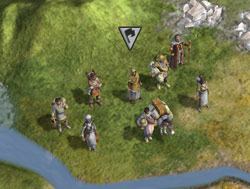The early game
| Edited | 28. Nov 2010, 04:30 |
| Published | 23. Nov 2010, 18:32 |
|
Pages
|
The early game is vital to your success, believe it or nay. If you don’t pay attention in the beginning, you’ll certainly regret it later once your progress stops or get beaten the crap out of.
OK, so you’re started up and hyped to become the supreme ruler of Pangea. Now let’s just deploy this settler somewhere and were ready to go.. but where? Generally you should try to position your city where you both got hills and a lot of food within close proximity. Having access to a luxury item or two can prove very handy as your first expansions can grow without fear of happiness causing growth stagnation.

The settler (or should I say settlers) has one mule to carry all their stuff.
Notice that the terrain stats will not have an effect on your starting food, production and gold, unless the stats are greater than the default stats (so ie. settling on a mine for more production won't have any effect). By default the tile your capital is settled on will produce 2 food, 2 production and 1 gold. This means that settling on a grassland with cows (3 food) will set the food to 3 in your capital tile, thus improving your development speed.
Tip: Always move the warrior before your settler to most efficiently find a good spot. Use hills to get a better view of the surrounding area.
Now you’re all settled in and comfortable, but no time to relax. You must choose which research technology you want to research. The obvious technology to research is Animal Husbandry so you can immediately see the horse resources. This will be important because horses are a strategic resource and many will try to secure them.
Your first unit should be a scout so you can efficiently reconnaissance the surrounding area. Your warrior should do the same. Look for good places to expand, special resources and the location of your opponents. You should get a rough overview of your position and can already make strategic assumptions like in which directions you would want to expand your empire in order not to get flanked later on.
Where and how to expand
Your first expansion is the most important. You need a strong foundation in order to build a succesful and powerful empire. The settlement should be fairly close to your capital, have decent access to food and importantly - be in close proximity to hills and production. This is imperative so you can build an army and take the initative in the early game.
Your other expansions also benefit from the points mentioned above, but prioritize securing strategic resources and luxury goods. In the beginning it’s practically obligatory to expand close to luxury items as your empire's happiness level will be akwardly low, unless you're lucky with luxury resources. It's a good thing to monitor your happiness meter (wouldn’t it be great to have such a device for ourselves?) and consider actions to prevent a smiley stagnation. Perhaps you’re on the plus side now but it can quickly change when having several premature cities grow (they're like rabbits!). Try to plan researching towards colosseum (the Construction technology) well ahead of disaster so you are ready to produce it whenever or before your smiles get stuck.
Tip: Don't underestimate mines! Having a decent amount of production available, even in low populated cities, can be very useful for pumping out an invasion army or reinforcements at a reasonable rate.
Remember to build roads to your expansions as soon as one of your workers is available. The road connection does not only give you gold for the established trade route but it gives you plenty of movement speed bonus. The speed bonus is absolutely brilliant; just think about how many moves your units spend during the course of a game. You’ll save TONS of time by building roads. And of course the obvious fact that you can rapidly send units to a city in need. The further away you build the expansion, the more important is building road.

Builds roads to connect your cities and get extra gold income and movement speed bonus.